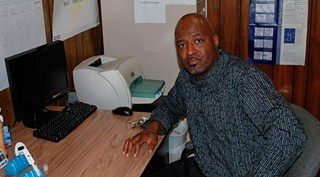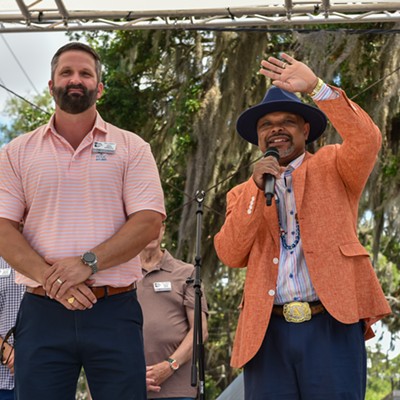This year marks the 30th anniversary since AIDS first appeared as a mysterious unnamed killer that turned lives and communities upside down. It was in the summer of 1981 that news of curious diagnoses of Pneumocystis pneumonia among young gay men began to spread, leading the Center for Disease Control to form a task force to investigate the medical anomaly.
It wasn’t until the following year that the name Acquired Immune Deficiency Syndrome was officially established, and it would take many more years before the disease was well understood.
While scientific research and public education have drastically altered the fight, the battle is far from over.
“People are working very hard to spread the news about HIV, but some people are hard heads,” says Lakeya Pressley, who works with the Health Department’s CARE Center, which offers testing, case management and other services for those living with HIV or AIDS in the community. “It appears that no matter how much folks know there are still those that take risks.”
This Monday, June 27, is National HIV Testing Day, and facilities across the city will offer free confidential tests throughout the day.
“It is an equal opportunity disease,” says Mark Douglas, the Executive Director of My Brothaz Home, a local non–profit organization. “It doesn’t care if you’re black or white or straight or rich or poor. It has everything to do with behavior.”
There are more than 1.1 million people across the country living with the disease, according to data from the CDC, and 30–40 million people living with the disease worldwide.
While the number of newly diagnosed cases of HIV and AIDS in Georgia each year has been in decline (it’s currently about half of what it was during a high point in the early 1990s), according to data from the state’s Department of Community Health, the epidemic of HIV/AIDS in the South remains a daunting issue.
“Southern states continue to report the highest number of new AIDS cases, the highest newly reported HIV cases, and the smallest decrease in deaths due to AIDS,” according to a report by the Southern AIDS Coalition.
In 2007, Southern states accounted for more than half of the countries HIV cases, according to CDC data.
“The South has the highest number of new HIV cases in the country, and yet we receive thelowest amount of money for HIV prevention,” explains Douglas, seated in the testing room across the hall from his office.
My Brothaz Home (MBH) conducts free testing year-round, usually averaging 60 tests per month. For the last several years, the National HIV Testing Awareness Day increases traffic to 60–70 in a single day.
“We have one of the highest sero–positivity rates in this area of the city,” he says. “More people test positive here than in any other location in Savannah. It’s not a good thing, but that’s just the way it is.”
HIV and AIDS disproportionately affect the nation’s poor and homeless, meaning that those who most need help are often the ones who can afford it least. Difficulty maintaining housing, poor diet and other struggles all negatively affect health outcomes of individuals who are already struggling to cope. Beyond just providing free testing, MBH tries to help.
The organization hosts weekly support groups, providing empathy, experience and community to the newly diagnosed.
Additionally, they try to assist with access to food, clothing, and transportation to medical appointments, but funding is tight.
Regardless of income level, every person who tests positive at MBH is given assistance with referrals to ongoing medical care, treatment providers and a case manager – the first steps down the path toward living with the disease.
Douglas has been active in the fight against HIV/AIDS for more than 10 years now, but it wasn’t something to which he planned on dedicating so much of his life.
In 2000, an HIV/AIDS awareness brochure lead him to Pandora Singleton’s Project Azuka, which provided services for women with HIV and AIDS during the 1990s and into the early years of the new millennium. Douglas began as a volunteer before becoming so involved that he quit his job in order to form MBH.
Shortly after forming the new organization, his fight against the disease became highly personal, following the death of his sister.
“I lost my sister to AIDS. Deborah died nine years ago this month from AIDS related complications. That further pushed me to do my work,” he explains. “Ten years later, we’re one of the few local non–profits in this area that is primarily focused on HIV prevention.”
Since the summer of 1981, AIDS has taken the lives of more than half a million people in the U.S., but nearly twice as many are still living with the disease.
That may be the biggest change during the last three decades – while diagnosis was once practically a death sentence (in 1994, AIDS was the number one cause of death for Americans age 25–44), advancements in treatment and pharmacology have drastically increased the life expectancy of those with the disease.
“When I began working with people who were infected, I wanted to give hope,” says Lakeya Pressley. “I didn’t want them to feel like I was taking away life, I wanted to feel like I was giving them an opportunity to live life on a better scale.”
The first step, however, remains getting tested.
“It’s better to know your status than to not know,” says Pressley.
Both the CARE Center and MBH will host special testing events on Monday in honor of National Testing Awareness Day (and MBH also offers screenings for Chlamydia and Gonorrhea). Sites across the city also offer testing, including the Phoenix Center (520 E. 34th St.), the J.C. Lewis Healthcare Center (120 Fahm St.) and the Curtis V. Cooper Care Center (106 E. Broad St.), among others.
National HIV Testing Awareness Day
Where: My Brothaz Home, 2111 Price St.
When: June 27, 8 a.m. – 8 p.m.
Cost: Free
Info: (912) 231–8727
CARE Center Testing Event
Where: Wells Park, 38th & Montgomery St.
When: June 27, 10 a.m. – 5 p.m.
Cost: Free
Info: (912) 651–2251





























